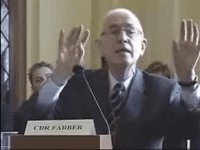 |
Military and Veterans' Suicide
November 26.2010
DOD & VA Continue to Evade Possible Role of Antidepressants in Rising Suicides
by Don Farber, Esq. (CDR, USN (Ret.)
On February 24, 2010 I testified in Washington, DC, before the House Veterans' Committee. Congressman Bob Filner (D, CA), the Chairman of the committee convened the hearing to probe the reason for the dramatic rise in suicides in recent years among active duty military and veterans. DOD data reported 312 suicides in 2009, 50 of which, i.e. 16%, in the Iraq/Afghanistan theaters. Chairman Filner made clear he was open to the theory that the high suicide rate could be attributable to the increasing, widespread use of antidepressants among the military, particularly in combat zones.
The hyperlink to the hearing is at: http://www.veterans.house.gov/hearings/hearing.aspx?NewsID=525. Filner's introductory remarks described the opposing schools of thought on what has been a long running debate on the antidepressant suicide issue. One group of advocates believes antidepressants and their side effects cause suicide and related severe side effects in some patients. A common corollary to this view is that over-medication occurs without proper diagnosis for minor or non-existent mental maladies. The opposing camp believes it is "depression" and related underlying disorders that cause suicide, and that it is irresponsible to blame antidepressants for suicidality given that such talk scares patients from taking what may be life saving treatment.
A November 26, 2010 update on the military suicide situation reported by USA Today ("Civilian Soldiers' Suicide Rate Alarming") showed continued bleak statistics. The newspaper reported there were 252 suicides among active and non-active Army members through October, 2010, as compared to 242 in all of 2009.
Invited to testify in February by Chairman Filner, I outlined the evidence sustaining my belief that antidepressants cause suicide in some people. I related the drug companies' and mainline psychiatry's historical denial of linkage between antidepressants and suicide, and their reversal of rhetoric after the Food & Drug Administration ("FDA") imposed suicide warnings on the drugs in 2004. When asked by the Chairman on causality, I cited the large settlements in antidepressant suicide litigation: "Of course antidepressants cause suicide. The drug companies wouldn't settle the antidepressant suicide lawsuits for the large sums that they do if these were merely nuisance lawsuits." I added that the drug companies and mainline psychiatry always denied any link between the medications, but retreated from the "denial" theme after the FDA in 2004 proved suicidality causation in children. I pointed out similar FDA data from 2006 on adult patients proved antidepressant suicidality casuality for young adults in the 18-24 age group.
The leadoff witnesses on the first panel before the committee were Psychiatrist Peter Breggin and biostatistician Andrew Leon. Dr. Breggin, a prominent author who warned of the antidepressant suicide risk more than a decade before the FDA issued suicide warnings, testified of the consistent data showing a causal link between antidepressants and suicide. Opposing Dr. Breggin was Professor Andrew Leon, PhD, a consultant to antidepressant drug manufacturers. He testified that antidepressant data shows the medications to be safe, and that there was no linkage showing causation to suicide in adults Leon did acknowledge causation in children.
I testified on the second panel. Others on that panel included a representative of the American Psychiatric Association, and one from the American Psychological Association. My testimony included critical commentary on the historical role of the American Psychiatric Association in resisting suicide warnings on antidepressant labels, and the organization's subsequent agreement with the warning after the Food & Drug Administration's ("FDA") 2004 decision to implement it.
The third panel consisted of Department of Defense ("DOD") senior psychiatrist, Army Brigadier General Loree Sutton, and Veteran Administration ("VA") psychiatrist Ira Katz. The DOD and VA witnesses stayed clear of the spirited and sometimes contentious exchanges between Dr. Breggin and Dr. Leon on the state of the evidence. The DOD and VA testimony, while acknowledging the FDA's suicide warnings on antidepressants, made clear both agencies heavily relied on drugs for mental health treatment, and that no change to that policy was in the offing. Both Dr. Sutton and Dr. Katz, emphasized their agencies' increases in mental health programs and services in response to the suicide concern, and heralded what they insisted were positive trends to cope with the problem. Surprising to many observers, Dr. Sutton, responding to the Chairman's inquiry, testified service members are taking SSRI (selective serotonin reuptake inhibitor) antidepressants, the "Prozac" type antidepressant that spurred the suicide debate starting in the early 1990's, at the same rate as the U.S. population, e.g. 17%. It was the SSRI data, too, that moved the FDA to issue its first suicide warning in 2004. The 17% figure raised eyebrows for many given that this young cross section of the population, an age group that during the recent healthcare debate were described as viewing themselves as "indestructible" and thus not in need of healthcare insurance, were popping antidepressants as much as the general population. The fact such young, healthy, and physically fit military members ingest SSRI's at the same rate as a population that includes the mentally ill, elderly, and disabled suggests the military services are resorting more to psychotropic drugs, not the same or less, to treat what in DOD are normally very healthy patients. The DOD and VA witnesses cited, as well, their agencies' coordinated efforts with the National Institute of Mental Health ("NIMH") to find solutions to the problem.
Colonel Bart Billings, PhD, a retired Army psychologist and sponsor of an annual well attended combat stress conference of military and mental health professionals at Carlsbad, California, near Camp Pendleton Marine Base, submitted written testimony critical of DOD and VA's near total reliance on medication to treat combat stress. Colonel Billings made clear he is of the view that the suicide problem is attributable to over medication by antidepressants, and that alternative treatments should be emphasized more in military medicine. Colonel Billings also called attention to the VA's reported stifling of information on suicide attempts among veterans. In his testimony Billings cited Emails of Dr. Katz reported in 2008 by the New York Times. In the May 11, 2008 Times article, Katz' reportedly told colleagues in an Email there were "1,000 suicide attempts per month" being reported in VA medical facilities, but that Katz reported to the House Veterans' Committee only 790 attempts in all of 2007. A VA spokesman, according to the article, expressed regret and promised greater transparency in the future. This issue was not raised at the February 24th hearing by either Chairman Filner or Dr. Katz.
Having patiently listened to the DOD and VA witnesses throughout their presentations, Chairman Filner made clear he was dubious of their approach. He said "(T)he suicides have increased. They are at a higher rate than they were during Vietnam. So something is going on that your concern is not meeting." General Sutton appeared frustrated the Chairman found her testimony to be less than responsive, explaining "I share your concern, Mr. Chairman. We are all on this journey together." Filner expressed doubt that DOD and VA were on the right track, raising the issue of troop constraints posed by a volunteer force fighting two wars. He stated "during combat situations when you are suffering because of the volunteer Army and there is a shortage of people, you are not doing anything to get people off of active duty, you want to keep them there. All of the testimony that I have read, and all of the talking to soldiers, and young veterans, is that clearly there are some ethical things that any doctor should address. Basically, they want to get them back onto the front lines as soon as possible and psychiatry or counseling is not the quickest way. We give them a pill, they will feel better, and go back.....we were treating these issues in active duty was basically to just throw pills at them, getting them back onto the front lines, or getting them back into battle. We did not want to lose them from the battlefield, basically."
 |
Chairman Filner
Conducting the Hearing |
Chairman Filner had picked up on Dr. Breggin's earlier testimony. Breggin had pointed out that young soldiers and marines, age 18-24 are in the age group that the FDA added to the antidepressant "black box" warning alerting to causation and suicide. Dr. Breggin cautioned these are young men and women in a stressful combat environment, armed with weapons, and when the volatile mix of antidepressants and battle fatigue in that environment set in, results can be tragic. Filner further challenged Sutton and Katz on the failure of both DOD and VA to ensure smooth transitions of service members from active duty back to civilian life. The period shortly after the member leaves active duty and as s/he re-enters civilian life is a most vulnerable time, the Chairman reported, and is the time when many mental health disorders, including suicidal behavior and post traumatic stress disorder ("PTSD") occur.
The bottom line, it appears, is that the DOD and VA continue to think "in the box" and without any hint or inking that antidepressants might be responsible to any degree for the high rate of suicides within the ranks. It is not that these agencies refuse to speculate on any number of possible causes for the high suicides. The November 26, 2010 USA Today article reported Army Colonel Chris Philbrick, assigned to the project, stated that soldiers killing themselves were found to have experienced home foreclosures, debits, loss of jobs, relationship problems, depression, substance abuse, combat stress, and mild brain injuries. What the article did not state or attribute to Colonel Philbrick's speculation was probably the greatest common factor of all among these suicides. We can deduce that by elementary logic without a degree in Statistics. That is that what was acknowledged by Dr. Sutton's testimony: "17%" of active duty soldiers are on SSRIs. What we didn't hear may be the most troubling. The Army (and the other services) have at their immediate disposal the medical records of all who have committed--or attempted--suicide while in a duty status. Retrieving data on whether or not the individual was on antidepressant therapy, or had recently terminated therapy, is easily accomplished. The fact that this type of data investigation is not being revealed--or even discussed--is noteworthy. Especially DOD, e.g. the military services, should be scouring the decedents' medical records and toxicology reports to determine which of the suicide victims were taking antidepressants (or other drugs). The fact DOD is not tipping its hand on the state of its curiousness on antidepressant involvement should be a red flag to Congress and the media to press forward on this issue. .
DOD and VA's nearly paranoid refusal to discuss the possible role of antidepressants in causing high numbers of suicide should be challenged--by the House and Senate Armed Forces committees to augment Chairman Filner's fine work on the Veterans' Committee. One does not have to be paranoid one's self or a conspiratorial theorist to charge DOD and VA with malfeasance on this entire matter. It appears pretty obvious, to me, having dealt with this issue for a decade with civilian doctors and lawsuits on antidepressant suicide what is going on. What DOD and VA are guilty of is age old paternalism--of which government agencies, including particularly the military, practice daily in controlling individual lives. Convinced antidepressants do a lot of good whether or not they may induced suicide, the military--and VA--hierarchies suppress the bad news on the medications so that the troops continue to faithfully take the pills without question. In terms of DOD and VA's motive, its likely more a policy based on fear and uncertainty of the unknown than on rolling over for the drug companies's huge profits or an callous disregard. No general or VA administrator would ever entertain the thought that his or her direction and decisions might be responsble for inducing to suicide the very troops under our care and protection. It's so much easier to blame "foreclosures" and "prolonged deployments" for the suicides. It would be considerably more discomforting and personally controversial to stir the pot and suggest publicly that "antidepressants," the treatment that appears conventional in American medicine--may be killing the troops. If DOD and VA would stop to reflect, they would hopefully come to the conclusion the FDA ultimately came to. That is it is far better to get out all these dirty secrets on antidepressants on the table--and let the American people, e.g. the individual patient and physician, decide individually whether to swallow these
mind altering drugs.
The FDA was guilty of the same type of paternalism for over a decade. Only political pressure forced the FDA to deal with the issue. It may be the military services are taking the same approach with antidepressants as the services have traditionally taken on such things as vaccinations, flu shots, etc. That has been the individual desiring to serve is given no choice in determining medical treatment. If that is DOD's secret attitude on antidepressants , such a policy is even more invidious given that its effect will be more long lasting on the individual service members. While not previously mentioned, the purely "anti anxiety" medication (not also an antidepressant), such as alprazolam (or "Xanax"), can be highly addictive. Addiction can be long lasting, carrying well beyond the military and into civilian life. An SSRI, such as Paxil, is also indicated for anxiety. Paxil is among the worse of the antidepressants in terms of recorded suicidality. That a military physician or even medic would dispense Xanax to a stressed out troop in the combat zone without informing the troop of the possible effects seems as plausible as questionable. This whole range of health care treatment assumed by military units should be scrutinized by Congress. Government, including the military, has done this before in history, often denying the individuals informed consent for the treatment. The "we know best" philosophy could be at work in DOD's refusal to acknowledge the possible role of antidepressants in these excessive military suicides. Their acknowledgement of the agency's patient monitoring instructions notwithstanding, the Pentagon and VA's refusal to acknowledge the FDA's findings on antidepressant suicide causality in the military's most populated age group, e.g. age 18-24, is a troubling sign that DOD and VA may be disregarding the most plausible explanation for this tragic and rising trend of suicides among service members.
 |
Don Farber Making
Point to Committee |
A glimmer of good news was apparent on February 24, 2010--and it should be shared. Throughout the half day hearing, there was one matter all of the factions agreed upon. That was despite the conflict on whether antidepressants do or do not cause suicide, all agreed it was sound practice to closely monitor patients for suicidality after antidepressant dosage commences, and after dose adjustments.. All agreed that the FDA's monitoring instructions should be followed for active duty military and veterans under VA care. How that can be accomplished in military units in a combat zone or for veterans getting care at VA clinics throughout the country, it was agreed, requires different considerations than those facing civilian doctors and patients . Consensus on monitoring patients constitutes progress on the antidepressant suicide issue. Before 2004 the FDA denied there was a link between antidepressants and suicidality. Before 2004 the FDA refused to place in the antidepressant labels the suicidality monitoring instructions--rationalizing that issuing such guidance would imply causation and scare people away from the medications. But now post 2004, everyone, including the drug companies and mainline psychiatry--have signed off on the need for everyone--treating doctors and family members of the patient-- to monitor the patient for suicidality after s/he starts antidepressants. That's some progress--considering mainline medicine's historical denial for so long a time that antidepressants were completely safe .
Next must be determined efforts to test a suicide hypothesis in connection with antidepressants. Given that neither the drug companies nor the federal agencies responsible for health and medicines have taken measures to ensure such clinical testing--perhaps the military services can be persuaded to lead this scientific effort. Soldiers, Sailors, Airmen, and Marines are our national treasure. Whether or not antidepressants have been responsible for these tragic suicides we continue to read about--we owe it to our warriors to find out. ///////////////////. . (s) Don Farber Nov. 26, 2010
Contact us about your legal matter today! |
 |









